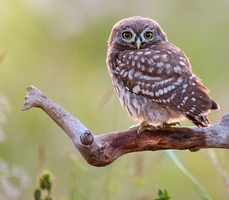
March 23, 2023—Since 2020, health authorities, including the Centers for Disease Control and Prevention (CDC) and the World Health Organization, have been monitoring a worldwide outbreak of bird flu viruses, called H5N1 clade 2.3.4.4b. And while a small number of humans have been infected, CDC reports that the overall risk remains low.
An animal health issue
Avian influenza type A viruses—commonly called bird flu viruses—are found worldwide. The disease is most common in wild aquatic birds, including ducks, geese, swans and gulls. These birds often don’t appear sick when they are infected.
Smaller birds—cardinals, robins, sparrows, blue jays or pigeons—don’t usually carry bird flu viruses that are dangerous to poultry or people. But there's evidence that raptors, such as hawks, falcons, eagles and owls, may be infected when they prey on birds that have the virus.
Bird flu can spread to farm or backyard poultry, such as chickens and ducks, if they have contact with infected birds or share sources of food or water with them. Domestic birds are more likely to show signs of illness—and they can die from bird flu.
The current h5N1 bird flu virus has also been found in mammals around the world, including sea lions, bears, foxes, skunks and farmed mink. CDC monitors these infections. Their tests have not found changes in the virus that are likely to make it more dangerous to humans.
Bird flu rarely infects humans
It's rare for humans to get sick from the H5N1 bird flu—even when other mammals are sick with the virus. But human bird flu infections can happen when the virus is inhaled or when it gets into a person’s eyes, nose or mouth.
So far, the people who have caught the virus were in close, extended contact with sick birds. There is no evidence of the current bird flu outbreak spreading from humans to other humans.
If the H5N1 virus—or any bird flu—mutates in a way that lets it spread from human to human, it won't be the same as the COVID-19 pandemic. According to CDC, current antiviral drugs can be used to treat bird flu. And vaccines are already being developed in case a new bird flu begins spreading easily from person to person.
Keep safe
To play it safe, avoid contact with wild birds. But if you work with wild or domesticated birds or are a hunter, be sure to wear gloves and a medical face mask and wash your hands after touching them.
Luckily, in the U.S., you won't get bird flu from eating properly prepared poultry.
Sources
- Centers for Disease Control and Prevention. “Ask the Expert: Highly Pathogenic Avian Influenza A(H5N1) Viruses.” https://www.cdc.gov/flu/avianflu/spotlights/2022-2023/avian-flu-updated.htm.
- Centers for Disease Control and Prevention. “Avian Influenza in Birds.” https://www.cdc.gov/flu/avianflu/avian-in-birds.htm.
- Centers for Disease Control and Prevention. “Current U.S. Bird Flu Situation in Humans.” https://www.cdc.gov/flu/avianflu/inhumans.htm.
- Centers for Disease Control and Prevention. “Frequently asked questions about avian influenza (bird flu).” https://www.cdc.gov/flu/avianflu/avian-flu-faq.htm.
- National Park Service. "Tracking a Flu Strain That’s Killing Wild Birds." https://www.nps.gov/articles/000/tracking-a-flu-strain-thats-killing-wild-birds.htm.
- U.S. Department of Agriculture Animal and Plant Health Inspection Service. "2022-2023 Detections of Highly Pathogenic Avian Influenza in Wild Birds." https://www.aphis.usda.gov/aphis/ourfocus/animalhealth/animal-disease-information/avian/avian-influenza/hpai-2022/2022-hpai-wild-birds.
- U.S. Department of Agriculture Animal and Plant Health Inspection Service. "Highly Pathogenic Avian Influenza and North American Wild Birds: Frequently Asked Questions." https://www.aphis.usda.gov/animal_health/downloads/animal_diseases/ai/faqs.pdf.
- World Health Organization. “Rapid Risk Assessment: Assessment of risk associated with recent influenza A(H5N1) clade 2.3.4.4b viruses.” https://www.who.int/publications/m/item/assessment-of-risk-associated-with-recent-influenza-a(h5n1)-clade-2.3.4.4b-viruses.